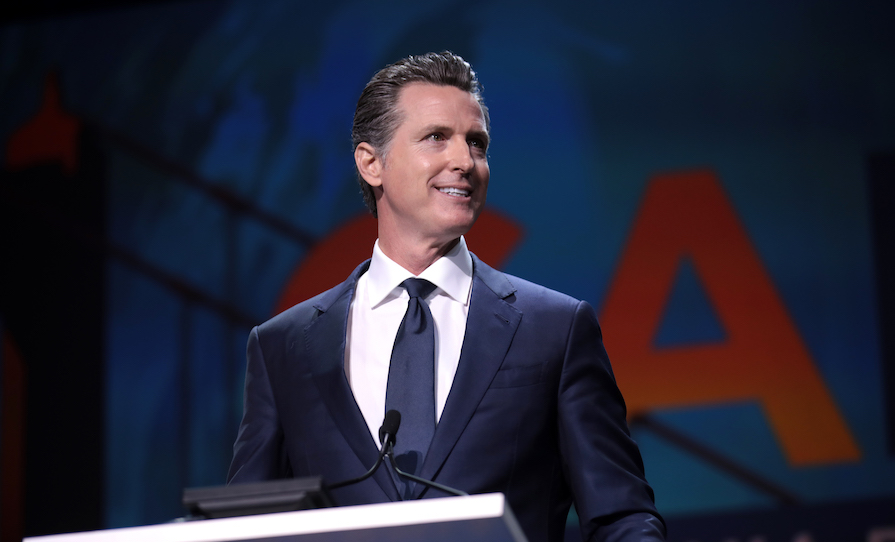Business groups are worried about California Gov. Gavin Newsom’s May 6 executive order that says workers who contract COVID-19 on the job may be eligible to receive workers’ compensation. The order allows any claim to presume that the worker contracted the virus on the job, but gives employers the chance to rebut.
“We are removing a burden for workers on the front lines, who risk their own health and safety to deliver critical services ... so that they can access benefits, and be able to focus on their recovery,” said Newsom in a press release.
The California Chamber of Commerce opposed the presumption in the order, saying it could drive up costs for businesses already struggling during the pandemic. The Associated General Contractors of California also opposed the presumption but notes that it can be rebutted by the employer.
The California Federation of Labor, which sought the workers’ compensation change in a March 27 letter to Newsom, said in a statement that the order "adds a vital layer of protection to essential workers ... during this pandemic."
Under the order, an employee may make a workers' compensation claim if he or she worked at an employer's direction at the place of business on or after March 19 and is diagnosed to have COVID-19 by a California licensed physician within 14 days of that work. Work performed at home doesn't count.
“Any COVID-19-related illness of an employee shall be presumed to arise out of and in the course of the employment for purposes of awarding workers’ compensation benefits…” if all requirements are met, the order says.
The majority of states that allow workers' comp claims for COVID-19 extend protections only to workers who provide primary care, such as healthcare workers and law enforcement.
While the presumption that workers contracted the virus on the job is disputable, “…the illness shall be presumed compensable, unless rebutted by evidence only discovered subsequent to the 30-day period,” says the order, which does not establish what discovered evidence is needed for rebuttal.
The presumption will stay in place for 60 days after May 6 and is retroactive to March 19.
In an online analysis, employment law firm Fisher & Phillips LLP says the rebuttal provision "is likely to be a high burden for employers to meet." It notes that "with a communicable disease that can be contracted in a number of ways (many of which are outside your control), how do you prove that COVID-19 was contracted outside the workplace? It’s a difficult task, meaning most claims are likely now going to be covered by workers’ compensation."
At least 13 states now have made workers' compensation possible for COVID-19, and with a few exceptions, limited to claims from health care workers and first responders.
Other States Cover COVID-19
Alaska, Kentucky, Minnesota, Missouri and Wisconsin changed workers’ compensation rules to include a similar rebuttable presumption that a COVID-19-positive employee sustained the virus on the job, says Caroline Dickey, an attorney with Barnes & Thornburg LLP.
llinois, like California, extended protections to all essential workers in its revised workers compensation plan issued in mid-April, but the Illinois Workers’ Compensation Commission repealed the law on April 27 after it was challenged in court by retail and manufacturing business groups, citing costs and time frame for legal battles.
The commission has not issued any further revisions.
The National Council on Compensation Insurance projected a "worst-case" potential loss of $81 billion for the 38 states and the District of Columbia, where it collects claims data.
"Employers and insurers did not set aside reserves counting on paying for a pandemic ... leading to pressure by some business and insurance groups to call for creation of a federal backstop, similar to the Terrorism Risk and Insurance Act, to take a share of the costs off of overburdened workers’ compensation systems," said the insurance industry publication in a May 12 update.
California's rate setting body, the Workers’ Compensation Insurance Rating Bureau, calculated a mid range estimate of $11.2 billion in losses for the state, although its CEO William Mudge said in a May 15 national insurance industry report that it will update, within the next two weeks, that analysis and further guidance.
But some workers' comp experts see the limited claim filing period and California's lower-than-national COVID-19 infection rate as key moderating factors in the projected costs.
Still, the new California executive order "will likely be challenged by businesses ... as they are forced to either pay employees’ medical bills or attempt to overcome the presumption,” says Dickey.
“Under this order, employees are entitled to full workers’ compensation benefits, including full hospital, surgical, medical treatment, disability indemnity, and death benefits,” she explains. “There is no waiting period for temporary disability benefits. However, before obtaining temporary disability or other benefits, employees entitled to COVID-19-related paid sick leave must first exhaust that leave.”
Attorney Benjamin Ebbink, partner at Fisher & Phillips, says California’s order shortens insurers’ timeframe—to 30 days from 90 days—to make compensability decisions.
“However, the order permits denials after this period based on new information,” he says. “This shortened timeframe will likely result in cost pressures to the system as a whole, and could result in delays for decisions on other non-COVID-19 related workers’ compensation claims as insurers prioritize their workload.”
California’s new order applies to all workers’ compensation insurance carriers writing policies that provide coverage in the state, as well as self-insured employers, and any other employer carrying its own risk, including the state of California itself. Nothing in the order limits the existing authority of insurance carriers to adjust policy costs.
Business Concerns
The California Chamber of Commerce said its concern is that the order covers any employee working outside the home.
As the economy begins to reopen, more workers will work outside the home, which would increase the number to whom the order applies, as well as the chances that people contract the virus outside of work as they possibly interact more frequently with newly re-opened businesses and activities.
The chamber said the executive order will “unnecessarily and significantly drive up costs for California employers through increased workers’ compensation insurance rates at a time when they are struggling to keep Californians employed.”
The trade group said that “imposing a legal presumption that any employee who contracts the coronavirus is covered by workers’ compensation benefits shifts the cost of this pandemic to employers,” adding that “the private sector did not cause this crisis, and it should not be the safety net used to pay for this crisis—that is the role of government.”
The Associated General Contractors of California said that it had been in talks with the Governor’s office for weeks about its concerns regarding the workers’ comp executive order, specifically the inclusion of a presumption clause. The group had pushed for no presumption clause, noting concerns about a “negative impact.”
But AGC points out that while “the presumption could have been conclusive and open ended, instead it is rebuttable and of limited duration.” It adds that the order includes “limitations to reduce costs by ensuring that sick leave benefits are credited against the workers compensation benefit.”
On May 7, California moved to the second-stage of its gradual economic reopening, with Newsom allowing the state's 58 counties to make decisions on whether and when certain “low-risk businesses” are allowed to open on a limited basis, including retail stores with drive-up pick-up.








Post a comment to this article
Report Abusive Comment